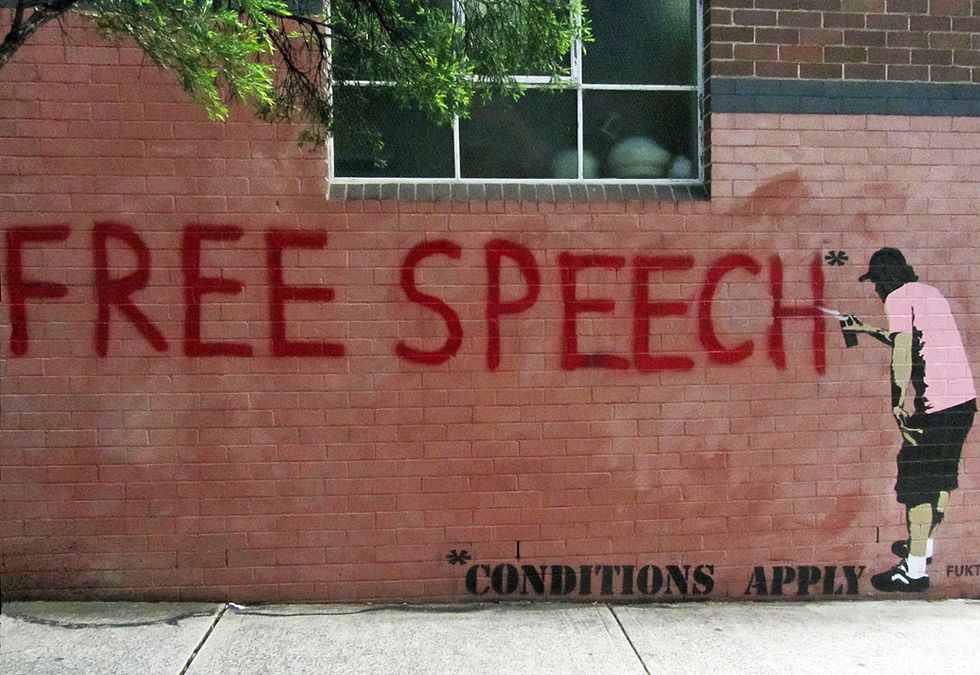I remember the first day I wore my "Temple College Republicans" shirt in public. It may not seem like a big deal, but it was a huge deal for me.
I felt empowered, but I also felt guilty. But why did I feel guilty for my own political affiliation? Because there's an unspoken suppression and even demonization of conservative opinions on college campuses.
Consider this quote from a recent Gallup poll: "Students on the left and right of the political spectrum tend to think conservatives are less able than other groups to express their views on campus."
Believe it or not, my experience with being a conservative woman at Temple has been pretty positive. I think a big part of this is our student government's efforts to truly embrace inclusion.
The president of Temple Student Government, Tyrell Mann-Barnes, met with the Temple College Republicans in the fall semester to discuss how he can help make conservative students at Temple feel less alienated by their peers.
Although I was unable to attend this meeting, I know it was a step towards greater acceptance and understanding of conservative opinions on campus. Unfortunately, other schools aren't as fortunate, and we still have a long way to go.
Many conservative students have increasingly been targeted by other students (and even professors), especially after Donald Trump won the presidency.
A recent event that sparked my interest to write this article occurred at Indiana University of Pennsylvania (IUP). On February 28, IUP student Lake Ingle was banned from a class called "Self, Sin, and Salvation" because of his 'disrespectful' comments and disruption to the classroom environment.
Was it a free speech issue or a disruption issue?
According to the official letter sent to Ingle by IUP, he was banned from class due to a violation of the disruption policy. He challenged the TED Talk that the professor played for the students. The speaker in the TED Talk was a transgender woman who spoke about gender and gender inequality.
After students were asked to respond to the TED Talk, Ingle challenged the claims of the speaker. His professor told him that he had to leave and could not come back. He would be required to attend an academic integrity hearing.
After being banned from the class, Ingle decided to fight for his entry back into the class because he needed it to graduate. He believed that he was not banned from the class solely for being disruptive; he believed that he was banned from the class because the university was trying to suppress his freedom of speech.
In a (now deleted) Facebook post, Ingle shares his view on the incident and the letters he received from IUP: "It is my belief that the instructor's decision to file these sanctions is an attempt to bully me into redacting my views, making it a matter of free speech."
After a week of Ingle being banned from the class, the president of Indiana University of Pennsylvania, Dr. Michael Driscoll, decided to put his academic integrity hearing on hold and allow him to return to class.
This incident shows that the issue of "free speech" on college campuses is complicated and may be entangled in a confusing array of university policies. Incidents like these cause tension between students on campus and prevent an open learning environment.
I believe that this was a free speech issue, but I think this incident also shows the challenge of creating an inclusive environment and simultaneously allowing potentially offensive views to be heard.
Colleges and universities preach diversity and inclusion. But silencing people like Ingle goes against that claim.
I do not think incidents like this will stop happening anytime soon. The most important thing is that universities react as carefully as possible, considering the effects that banning students from class with unpopular opinions can have on the overall learning environment.




















 sunrise
StableDiffusion
sunrise
StableDiffusion
 bonfire friends
StableDiffusion
bonfire friends
StableDiffusion
 sadness
StableDiffusion
sadness
StableDiffusion

 purple skies
StableDiffusion
purple skies
StableDiffusion

 true love
StableDiffusion
true love
StableDiffusion
 My Cheerleader
StableDiffusion
My Cheerleader
StableDiffusion
 womans transformation to happiness and love
StableDiffusion
womans transformation to happiness and love
StableDiffusion
 future life together of adventures
StableDiffusion
future life together of adventures
StableDiffusion





















